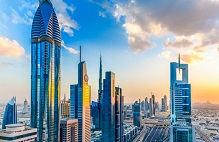Gulf Finance House (GFH) said in a statement that it "remains committed" to the Tunis Financial Harbour project, which it first unveiled in October, 2010 – months before a Tunisian street vendor set himself on fire, setting off demonstrations and unrest across the Middle East that came to be known as the Arab Spring uprising, which in turn put many development projects in the region temporarily on hold.
Tunisia’s then-president, Zine El Abidine Ben Ali, stepped down on 14 Jan 2011 and fled the country, resulting in a still-continuing period of economic and political evolution.
In announcing that the Tunis Financial Harbour is now set to go ahead, GFH took the opportunity to clarify remarks apparently made in a recent interview with Bloomgerg, in which acting CEO Hisham Alrayes was quoted as saying that the company would be seeking to sell assets in India and Tunisia, in order to buy more potentially high-yielding ones elsewhere.
While it does intend to withdraw from some projects, it is doing so "as part of a plan that started in 2012", GFH said. In addition to remaining committed to the Tunisian development, it added, "GFH is working on high-yield income-generating properties in the GCC, Dubai in particular. The due diligence for various opportunities is currently under way, and the transactions are expected to take place in 2013."
As reported, when it originally unveiled the Tunis Financial Harbour project, Gulf Finance House said it was envisioned as serving as “a bridge between the $15bn EU trade bloc, Tunisia’s own dynamic economy, and rapidly-developing North African and sub-Saharan economies”.
At that time, it said the $3bn, mixed-use waterfront development would, when completed, have a permanent residential population of 110,000 across its 500 hectares, and add 16,000 jobs to the Tunisian economy.
GFH is perhaps best known to many British football fans as the parent of GFH Capital, a Dubai-based company which acquired the Leeds United football club in December.
Islamic finance, infrastructure
Established in 1999 and listed on the London, Kuwait, and Bahrain stock exchanges and Dubai Financial Market, GFH claims to have raised more than $5bn to invest in Islamic financial institutions and infrastructure projects over the past 13 years. Its projects have included First Energy Bank, the world’s first Islamic investment bank focused exclusively on the energy sector; the Khaleeji Commercial Bank in Bahrain; QInvest in Qatar; Arab Finance House in Lebanon; First Leasing Bank in Bahrain; and the Asia Finance Bank in Malaysia.
Other GFH real estate projects in addition to the pending Tunisian scheme include the Bahrain Financial Harbour, completed in 2009, and so-called "energy cities" in Qatar, Libya and India.




